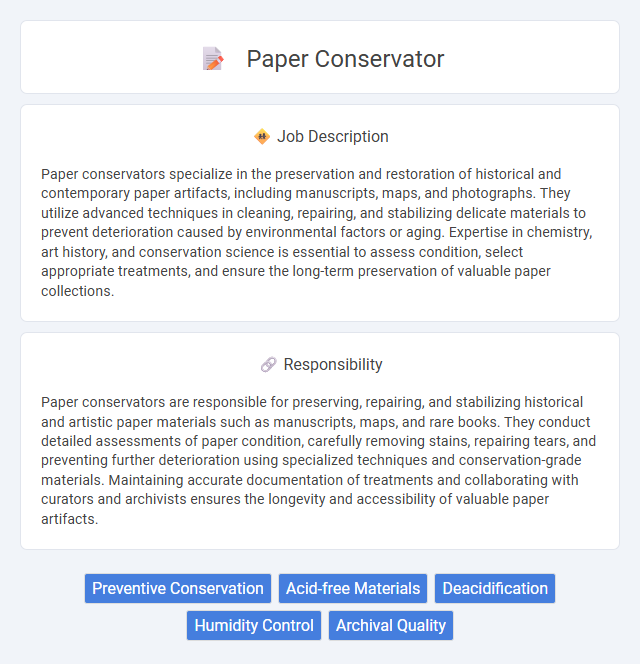
Paper conservators specialize in the preservation and restoration of historical and contemporary paper artifacts, including manuscripts, maps, and photographs. They utilize advanced techniques in cleaning, repairing, and stabilizing delicate materials to prevent deterioration caused by environmental factors or aging. Expertise in chemistry, art history, and conservation science is essential to assess condition, select appropriate treatments, and ensure the long-term preservation of valuable paper collections.
Individuals with a strong attention to detail and a passion for preserving historical artifacts may be well-suited for a paper conservator role. Those who are comfortable working meticulously with delicate materials and have patience might find this profession fulfilling. However, people who prefer fast-paced environments or physical labor may not be ideally matched with the careful, precision-based nature of paper conservation work.
Qualification
A paper conservator typically holds a degree in art conservation, library science, or a related field, often complemented by specialized training in paper conservation techniques. Proficiency in chemical analysis, knowledge of archival materials, and experience with restoration methods are essential qualifications. Certification from professional organizations such as the American Institute for Conservation (AIC) enhances credibility and career prospects.
Responsibility
Paper conservators are responsible for preserving, repairing, and stabilizing historical and artistic paper materials such as manuscripts, maps, and rare books. They conduct detailed assessments of paper condition, carefully removing stains, repairing tears, and preventing further deterioration using specialized techniques and conservation-grade materials. Maintaining accurate documentation of treatments and collaborating with curators and archivists ensures the longevity and accessibility of valuable paper artifacts.
Benefit
Working as a paper conservator may offer the benefit of preserving valuable historical documents, which can provide a strong sense of purpose and accomplishment. The role likely involves developing specialized skills that enhance career opportunities in museums, archives, and libraries. Opportunities for collaboration with other conservation professionals could increase learning potential and professional growth.
Challenge
Paper conservator roles likely involve the challenge of delicately handling fragile historical documents to prevent further deterioration. Ensuring accurate restoration without compromising original materials requires meticulous attention to detail and advanced knowledge of conservation science. The unpredictable condition of aged paper and varying damage types may pose ongoing obstacles in developing effective preservation strategies.
Career Advancement
Paper conservators specialize in preserving and restoring historical documents, maps, and artwork on paper, requiring expertise in chemistry and art history. Career advancement often involves gaining experience with high-profile collections, obtaining advanced certifications like AIC accreditation, or pursuing leadership roles in museums, archives, or cultural institutions. Mastery of emerging conservation technologies and continued professional education significantly enhances prospects for senior conservator or managerial positions.
Key Terms
Preventive Conservation
Paper conservators specializing in preventive conservation implement strategies to minimize deterioration of archival documents, rare books, and artworks on paper. They control environmental factors such as humidity, temperature, and light exposure, while recommending appropriate storage materials like acid-free folders and UV-filtering enclosures. These professionals also conduct condition assessments to identify potential risks and develop maintenance plans that extend the lifespan of fragile paper artifacts.
Acid-free Materials
Paper conservators specialize in preserving and restoring delicate documents using acid-free materials to prevent deterioration and extend longevity. Acid-free papers and boards provide a stable, pH-neutral environment that inhibits yellowing, brittleness, and chemical damage over time. This careful selection of conservation-grade materials is critical for maintaining the historical and cultural integrity of archival collections.
Deacidification
Paper conservators specialize in preserving historical and fragile documents through advanced techniques such as deacidification, which neutralizes acidic compounds to prevent paper deterioration. This process involves applying chemical treatments that stabilize the paper's pH balance, extending the lifespan of valuable manuscripts and archival materials. Expertise in deacidification methods directly contributes to the conservation and restoration of cultural heritage collections worldwide.
Humidity Control
Paper conservators meticulously regulate humidity levels to preserve the integrity of delicate archival materials and rare manuscripts. Maintaining relative humidity between 45% and 55% prevents paper from becoming brittle or moldy, ensuring longevity and preventing chemical degradation. Advanced climate control systems and hygrometers are essential tools for monitoring and adjusting environmental conditions critical for effective paper conservation.
Archival Quality
Paper conservators specialize in preserving and restoring valuable documents by using archival-quality materials that ensure long-term durability and protection against deterioration. They assess the condition of paper artifacts and apply conservation techniques such as deacidification, mending tears with acid-free adhesives, and proper storage using acid-free folders and boxes. Expertise in archival quality standards is essential to prevent damage from environmental factors like humidity, light, and pollutants.
 kuljobs.com
kuljobs.com